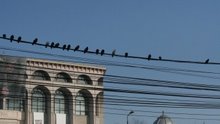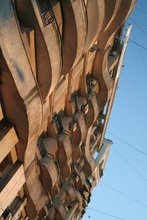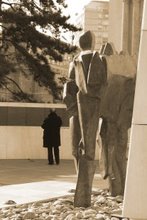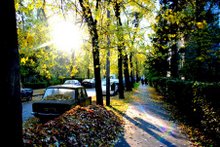I never really understood religious practice until recently. It may seem pretty ludicrous considering anthropology deals a lot with religion, but it is true. It does not mean I never learnt about religions in the widest possible sense of the word. It does not mean I never tried to understand. It does not mean I never wanted to be part of a religious ‘community’. I wanted to be Catholic at times. I was, furthermore, like a lot of teenagers, fascinated by Eastern spirituality, meditation discipline and the ability to shape and lead one’s person through all kinds of ritual and everyday practices and habits. I felt strongly about the topic from quite early on, and I loved Schwëster Céline’s example of religious teaching in first and second grade, as well as another Katechet’s in fourth grade. It was about stories conferring what it means to be a good person, some historical teaching about the origins of Christendom (probably highly biased), and a lot of singing. I was fond of various aspects of mass, especially the phrase Herr, ich bin nicht würdig dass Du eingehst unter mein Dach, aber sprich nur ein Wort, so wird meine Seele gesund. I do not think I understood a lot, but I also liked the Credo, and, of course, the Hostie that used to stick to the top of my mouth.This is the origin story of my subsequent aversion to Catholicism. In 1991, when Iraq invaded Kuwait, one priest (Dächen) who had never even heard the word pedagogics but who was teaching us two hours a week, had us pray that the Third World War would not begin with this event. I went home in a panic. I was scared of his inappropriate stories of dying people he visited to give the last rites. He told us elatedly that his very dear friend had just been made bishop (about a year later, this bishop was responsible for our confirmation and said to me that I was wearing a nice dress, which had me puzzled – it has remained the only words I have exchanged so far with a bishop). We were eleven-year-olds under the madness lessons of a jumping, screaming priest who made the floorboards shake, and who dictated about the sacraments the rest of the time. The memories are brought back to me even today most vividly as I walk my dogs on a hill neighbouring the village when the wind carries the melody of those church bells to me. I was scared, and attempted to conform as well as I could. I strongly disliked the regime of punishment that happened in primary school when we missed out on certain masses. Some children got ‘gifts’ for attending, while the others… well, got scolded. I found unacceptable and stressful to the point of vomiting (but that is another story that will be spared to those I have not yet shared it with…) that a different teacher could pray with us every day and yet treat us blatantly and randomly differential by throwing large bundles of keys at our faces, and screaming at us. I was protective of my brother and did not like him being terrorised by the urging of various teachers and priests to follow a strict regime of Sunday mass, otherwise Hell would be unavoidable. Whatever happened to the merciful new God, a definite improvement on the avenging God of the Old Testament? How strictly the dogma is to be applied also depends on the willingness of people to accept it, but children, I think, should be protected from this kind of power games, and demonstrations of oh so little minds. Stëchwierder: divorce, deadly sins, the holy trinity, going to mass X times a week versus nasty gossip, judgementality, hypocrisy, conflict-eagerness, narrow horizons and boredom not channelled into positive creativeness. Following my father’s words, and developing an inclination to seek truth in philosophy, literature and history books as an arrogant, self-absorbed teenager, I decided that the church as an institution had to be condemned for all its wrongdoings and partiality throughout time. This would help to get things right in the future, which I imagined, of course, as secular as possible. I would argue this with teachers of religion. I would show complete disrespect to them, which makes me feel ashamed even now. I would argue this, defending laďcité, the Enlightenment, and all the rest of secular Western values. I failed to consider to a large extent, with all my concern on the failings of people working for churches, what religion means for people on a daily basis. I never came to agree with the rationale(s) behind Catholic celibacy, Catholicism’s obvious privileging of men, and its stance on birth control, the infallibility of the pope, nor can I empathise with certain kinds of US Protestantism or the complicated reasons behind religious extremism, when religion is uncannily closely allied with politics, hatred and identity. I will still today argue for the validity of secularism, but with some necessary qualifications. As I grew older, I became less radical – a real softie! A few things happened: first, I came to think about morality a lot. Second, I went through the process of coming to hold very dear some people who were believers of various kinds. I admired, respected, and, possibly failed to emulate their moral stamina and way of embracing the world. Third, the question of how you can reconcile your own views, perspectives and fundamental beliefs with others, who are seeing this world in very different terms, became more and more pressing as I learnt more about anthropology. Tanya Luhrmann has worked on a related question. In order to get into someone’s skin, it is not enough to learn the discourses. To summarise her work in North America very superficially, she is looking into the topic of how people become religious, and why certain people are more likely to have religious experiences (e.g. speaking in tongues, apparitions, etc.) than others. Why I was saying that I never understood religious practice until recently is because I never had an approach that was any other than led almost purely by my mind, by what I considered rational. I had no way of experiencing religion in emotional terms, except, possibly, through singing and playing instruments. I had no need to communicate through God with those I was worried about, because I was working in ways that were very self-centred and individualist. I may have had difficult moments, but I was always able to get help from other people: I was never on my own, yet I thought I could resolve anything with my head. I despised a lot about the village I grew up in because of its confessed religiosity and its multiple expressions of the contrary. It is a particularly apt example of a modernist vision of the world. I think it is the realisation that not everything is up to your own person that makes people like me, who have not been habituated as much with the religious disciplines of the person from early childhood, slowly comprehend with all your senses, all your ways of perceiving and understanding that churches can be places of comfort. Churches are buildings of peace, of recollection, of memory, of contemplation, of communication, of clarity. While I definitely had been in awe of churches as buildings before (Notre Dame de Paris, Chartres, Reims, Sevilla, Cordoba, Avila, Salamanca, Florence, Aachen, Sainte Gudule, Glasgow Cathedral, Westminster Abbey, St. Paul’s, Iona Cathedral, St Machar’s, Sagrada Familia, Cathédrale de Luxembourg, Sfantul Iosif Bucharest, to name but a few), and while I had sought them out for reasons that were unclear to me, I did not consider the links between architecture, aesthetics and emotions. Here, as in other architectural examples, orientation in space and time, and ordering of space comes close to an ordering of the cosmos, an ordering of the self in time. What it means to a person to light a candle for a dear person who has passed away, is to establish and make present the memory of all time spent together. It is to create, or highlight an emotional connection that has never been severed. It is to find hope and relief in a moment of silence and to take courage again to face everything else. What else is communion?I’ve always been a bit slow to understand certain things, especially those defying the kind of logic I am tending towards (or should I say ‘find easier to deal with’?). But I get there eventually…[After I had a long conversation with one of the priests here, I find that my idea of Christian religion is not in line with the hierarchical thinking of the more traditional elements of supposedly not just the Orthodox church. I have a problem with being told what to do, and so I am not sure if I will ever feel the need to go beyond that and submit to these kinds of demands of acceptance]03.04.07


























